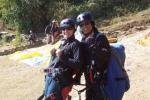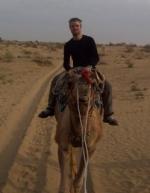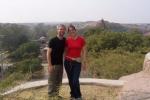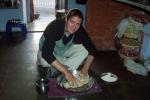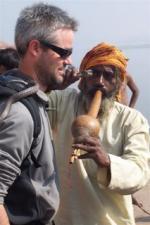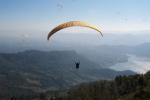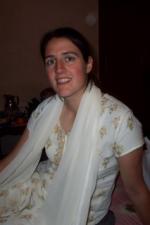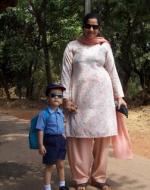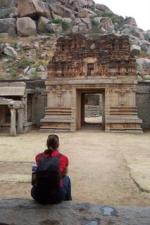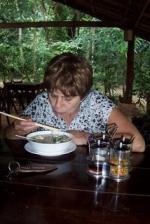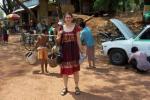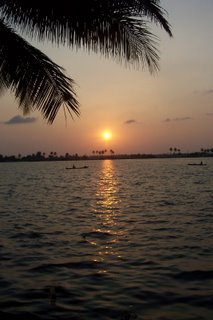
Sunset over Kerala's backwaters.
It was another long and dusty ride in a windowless bus down the mountain from Munar back to the lowland city of Kottayam. From there, we took a local ferry to the tourist town of Alappuzah while surveying the gorgeous green landscape of of Kerala's river-side life and rice plantations.
In 1957, Kerala became the first place in the world to freely elect a communist government (the second time this rare event occured was in Nepal). This is not too surprising considering that India initially sided with the Soviet Union during the cold war. More surprising is the degree of success with which this communist government has managed in the last fifty years. It has been labeled the most socially advanced state in India boasting the highest literacy rate in any developing nation in the world (91 %), an infant mortality rate one fifth the national average, and a life expectancy that is 10 years longer than the rest of the country. Communists can take heart in Kerala as evidence that there may, after all, be some grain of truth in this economic philosophy.
Unfortunately, a lack of any industrial development in the area has forced many of their educated youth to either leave the region, or simply languish in failed potential: Kerala also has the highest suicide and liquor consumption statistics in the country. The recent boom in tourism is seen as a solution to this problem, and nowhere is this more evident than in the small town of Alappuzha which serves as a gateway to Kerala's famous backwaters. Several ferry stops before we arrived at the city, our boat was flooded with a wave of pushy touts, engulfing every white passenger in a sea of countless hotel and river boat tour offers. Katlijn and I were quickly swept away towards what could possibly be the crummiest budget accommodation offer in all of India. Sweating profusely underneath a holy mosquito net listening to the loud repetitive din of a rusty overhead fan wobbling ineffectively above us, Katlijn observed that "this is the worst place in the world we could be right now" before we decided to down a couple of sleeping pills to hasten the arrival of dawn.
Faced with the prospect of another restless night in South India's ever climbing temperatures, we decided to take an overnight trip on a personal luxury house boat- the quintessential Kerala backwater experience.
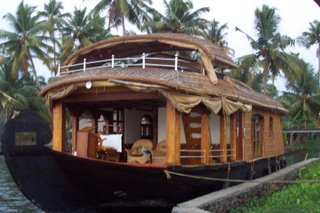
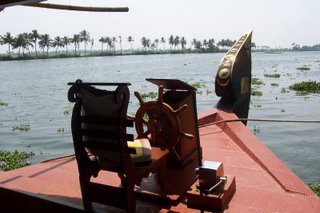
Our houseboat.
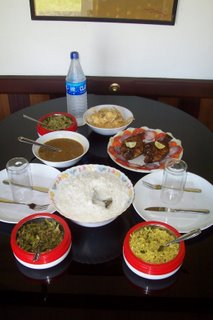
Shameful decadence. A typical on-board meal presented to us by our chef: salads, curries, rice, and Keralan-style fried fish.
The backwaters are a vast 900 km network of thin waterways meandering labyrinthine along Kerala's coastline. As our house boat made its way through these waters, we floated quietly by gorgeous villages, mosques, churches, and temples nestled along the riverbanks between thick palm tree jungles, coconut groves, and rice paddies. The journey is filled with all the exotic sites of tropical backwaters: fishermen fishing, women smacking their laundry on make-shift ghats, and commuters paddling canoes along liquid highways.
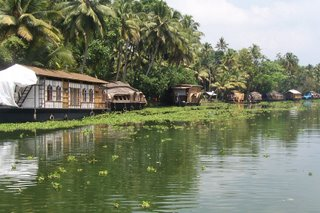
House boats floating along the river.
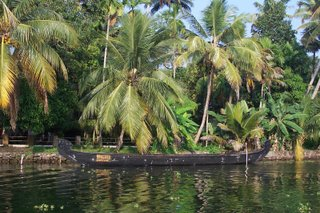
Canoes take the place of cars in Kerala's backwaters.
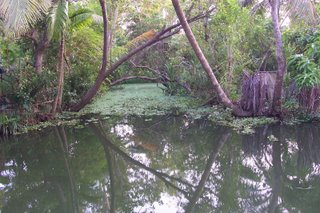
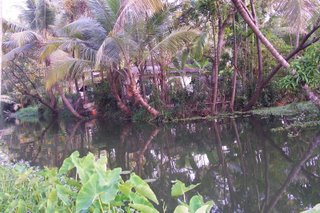
Trees reflecting in the early evening light off a narrow waterway
As Katlijn and I relaxed in the comforts of our admittedly excessive floating palace, guzzling coconut milk and gorging on Kerala's delicious fish curries brought to us by our personal on-board chef, we felt happy to be doing our part in solving Kerala's social woes.
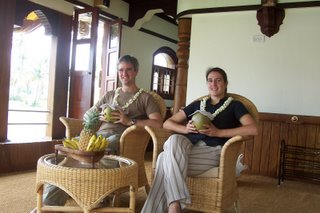
|



